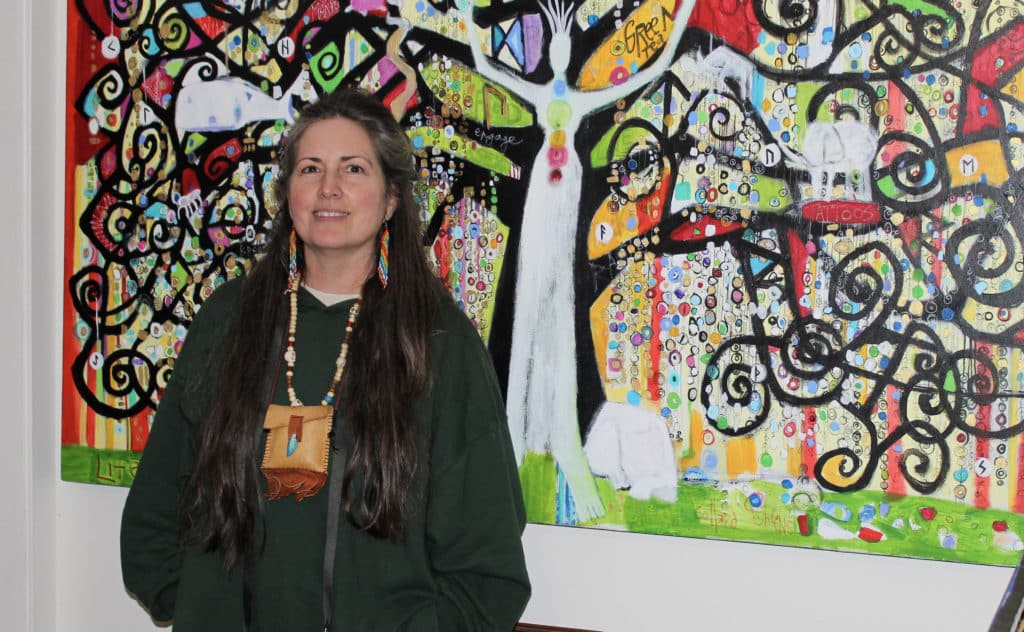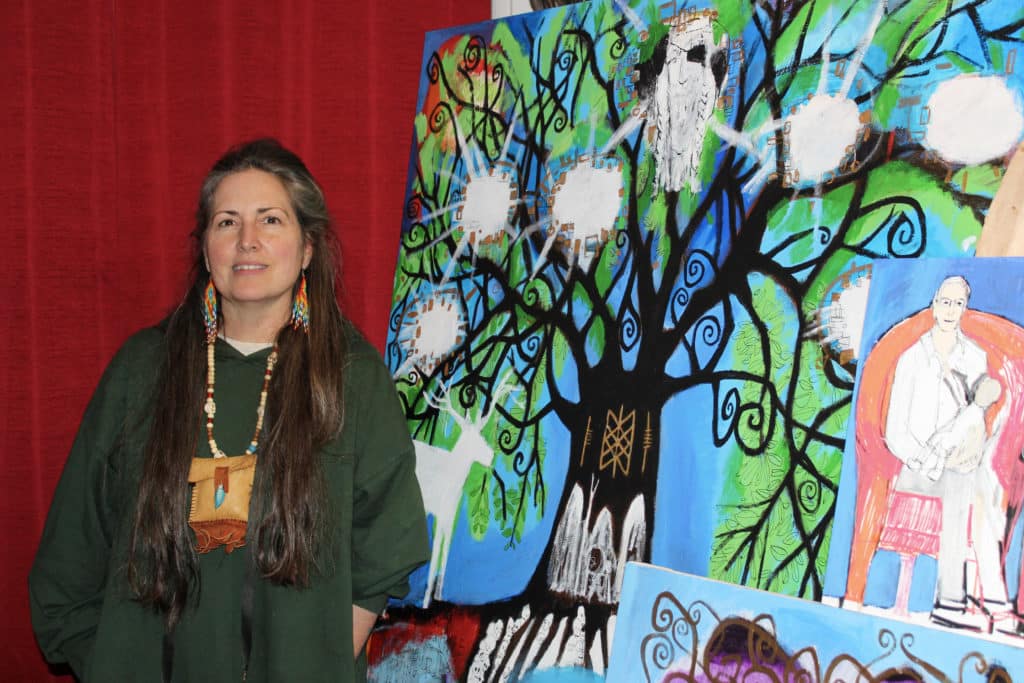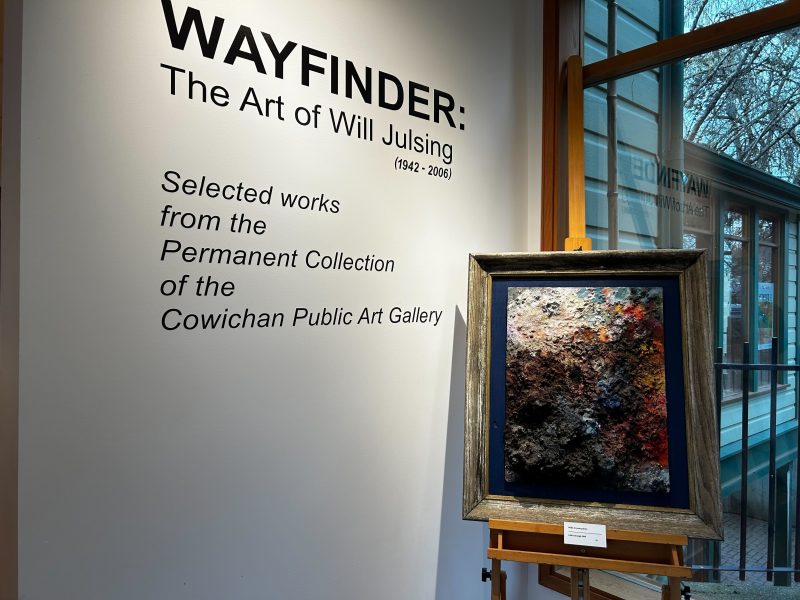
Last month, local artist Coco Jones received the City of Duncan’s 2022 Perpetual Arts trophy, awarded for excellence in the performing, literary or visual arts. It’s a well-deserved honor for one of the most-recognized artists in the Cowichan Valley, lauded for how she cherishes and gives back to the community.
At age 52, Jones continues to produce stunning works of art, despite spending the past decade battling and transcending a diagnosis of multiple sclerosis.
An artist since the time she could hold a pencil
Jones grew up in Dundas, Ontario and says she has been an artist, “from the time [she] could hold a pencil.” All of her school teachers would refer to her as an artist and encourage her creativity, recalls Jones, whose mother and aunt were both portrait artists.
When she was younger, Jones primarily did pen and ink drawings and says she didn’t actually know how to paint. But one day in Toronto when she was 18- or 19-years-old, Jones stopped at a window display of paintings.
“I might not have said it out loud, but I remember thinking ‘oh, that’s what I’m gonna do,’” she recalls.
After high school, Jones joined the Canadian Forces Naval Reserve and in 1990 was stationed in Victoria where she met her future husband Rickie Jones. She says he made it possible for her to relocate permanently to Vancouver Island after her naval stint ended.
They moved to the Cowichan Valley in 1993 and Jones had faith that she could make it as an abstract expressionist painter. Although she says it continues to be a far-from-easy career choice, she feels fortunate that from the very beginning she has been able to make a living selling her work.
Self-taught, Jones says her work has been influenced by Matisse, Picasso and French painter Pierre Bonnard among others. Colour, luminosity and “line as form” are important to her work, she explains. Jones considers herself a “psychic artist” and says there is an energetic component to her work that may not be measurable, but is there nonetheless.

The result is a style that many find instantly recognizable.
“It doesn’t seem to matter what I paint, people can always tell it’s my work for some reason,” she says.
Multiple sclerosis diagnosis has not stopped Jones from painting
In 2012, Jones was diagnosed with multiple sclerosis (MS), a chronic disease that affects the central nervous system. Her doctor could tell she had MS even before he saw the brain scans because of how she filled out the medical forms — her shaky penmanship a far cry from her usual pretty handwriting.
“It was debilitating,” Jones recalls. “I was losing my arms and legs. I had full body neuropathy. I couldn’t sense through my fingertips. My left hand was curling up. I thought I was a goner.”
Jones says she was motivated to fight her condition because she wanted to be around for her four children and husband. Despite acknowledging the real possibility that she might die from her condition, Jones says she never thought she would have to give up painting, even if she could no longer hold a paintbrush.
“I figured I would use my mouth … It would take a lot to make me stop being a creative being,” she says.
Eschewing pharmaceutical drugs to treat MS, Jones has, over the past decade, been able to manage her condition through a variety of means. These include nutritional supplements and enemas, energy medicine, meditations and a whole foods diet.
Despite some very scary moments over the past decade, including surviving an hour-long seizure seven years ago, Jones says that her neurologist has been amazed by how well she’s doing. Sometimes, she even forgets she has MS.
“I just don’t have time for it any more,” explains Jones, who says she is focusing her time tending to family, as well as her art.
While MS hasn’t affected her ability to paint, Jones says she had to give up on using the back end of the paintbrush to engrave words on her paintings. Instead, prompted by Diane Scott from Scott’s Toys and Hobbies in Duncan, she now uses paint pens, which she says have become an integral part of her work.
Jones paints for five hours every day, but has yet to paint anything about her condition.
“I don’t want to put too much energy on that,” she says. “I’d rather see myself whole and functioning and strong.”
Painting what others may not see
For the past three years, Jones has been participating in a plant spirit medicine intensive led by local medical herbalist Megan Waddy that has included what she says are “some pretty intense experiences,” such as a couple of four-day solo journeys in the wilderness. Jones, who says that she has always been a “seer,” credits these experiences with helping her “see things that other people don’t see” and influencing what she paints about.
Jones currently has 10 paintings on the go in her home studio in Duncan, which she says is typical. She paints a wide range of subjects because there are so many things that fascinate her, she says. These include trees, animals such as white buffalo and elephants, and people who inspire her, ranging from Sitting Bull and Anthony Bourdain to everyday people who aren’t famous. Sometimes, Jones herself is the subject matter.

This summer, Jones had some of her work on display as the guest artist for Ladysmith’s Arts on the Avenue Festival. But lately, she says hasn’t been doing much promotion beyond Instagram and Facebook. Her website hasn’t been updated since the person managing it retired a few years ago.
“I have to take hold of the reins and do everything by myself. It’s intimidating when all I want to do is paint,” she says.
Jones says that she appreciates the beauty of the Cowichan Valley and how the thriving local arts scene fosters creativity. In gratitude, Jones donates some of her art to support worthy causes. She will sometimes ask a question to her social media followers, such as what they’re grateful for or a recent kindness they’ve received, and then give away a print to the person with the best answer.
“I just feel like art is to be shared and to benefit the community,” she says. “As soon as I figured I could be of some kind of service, I’ve always donated. And I don’t think that there’s an artist that isn’t like … ‘we’re here to help.’ We help ourselves just by being in the creative process, but we help others by allowing them to observe a mirror in their own lives as well.”
This fall, Jones taught a one-day sacred art course to enable participants “to paint from their spirits and to recognize the creative blocks that they have or the spaces in their body where they’re holding [tension].” She plans to teach that course again once her family life settles.
In the meantime, she will continue to paint five hours a day, with her eye to the future.
“When I got diagnosed, I was at the tip of the iceberg of what I could do,” Jones says. “I feel like I barely know what I’m doing now, and I’ve been painting for 32 years … I feel like my best work is yet to come. ”



